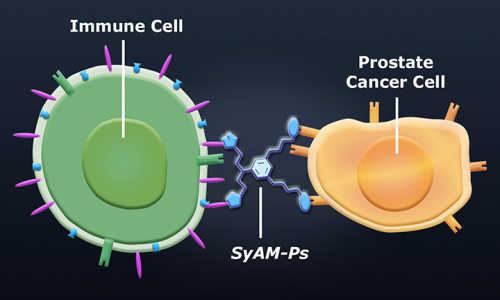A Yale University lab has crafted the first synthetic molecules that have both the targeting and response functions of antibodies. The new molecules — synthetic antibody mimics (SyAMs) — attach themselves simultaneously to disease cells and disease-fighting cells. The result is a highly targeted immune response, similar to the action of natural human antibodies.
The new molecules — synthetic antibody mimics (SyAMs) — attach themselves simultaneously to disease cells and disease-fighting cells. The result is a highly targeted immune response, similar to the action of natural human antibodies. Photo Credit: Image courtesy of Yale University
“Unlike antibodies, however, our molecules are synthetic organic compounds that are approximately one-twentieth the size of antibodies,” said David A. Spiegel, a professor of chemistry at Yale whose lab developed the molecules. “They are unlikely to cause unwanted immune reactions due to their structure, are thermally stable, and have the potential to be administered orally, just like traditional, small-molecule drugs.”
Spiegel and his team describe the research in a paper published online Dec. 16 by the Journal of the American Chemical Society.
The paper looks specifically at SyAM molecules used to attack prostate cancer. Called SyAM-Ps, they work first by recognizing cancer cells and binding with a specific protein on their surface. Next, they also bind with a receptor on an immune cell. This induces a targeted response that leads to the destruction of the cancer cell.
Spiegel said the process of synthesizing and optimizing the structure of the molecules required considerable time and effort. “We now know that synthetic molecules of intermediate size possess perhaps the most important functional properties of antibodies — targeting and stimulation of immune cells,” he said.
“It’s also noteworthy that molecules of such a small size can bring together two objects as enormous as cells, and trigger a specific functional response, entirely as a result of specific receptor interactions,” Spiegel added.
Beyond their potential for treating prostate cancer, SyAMs may have applications for treating other forms of cancer, HIV and various bacterial diseases.
Story Source:
The above story is based on materials provided by Yale University, Jim Shelton.





